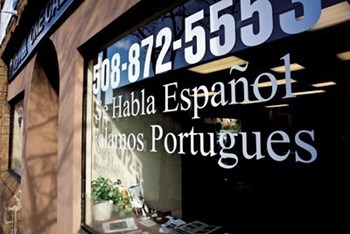
Of the many questions confronting a business owner today, one of the most complex and emotional is that of language diversity. In the condo management field, we already have too many challenges, from being on beeper 24/7, to volunteers changing too frequently, to aging properties having bigger repair needs than approved budgets.
The last thing we need is to add the extra cost of communicating in other languages. Thus, the emotional, political issue of "English-only" hits hard at the management firm that already is struggling with financial and labor constraints.
So what is a condo management firm company owner to do? There are two ways to approach this challenge. One is to fight the trend and the other is to leverage it!
Change Can Be Leveraged
When looking for ways to deal with current challenges, it is often valuable to consider how prior great leaders would likely confront such a challenge. It is my view that the vast majority of great leaders tend to leverage emerging trends; riding the wave, not allowing themselves to be crushed by the waves of change.
As one researches successful people, one common theme is that these people appear to "see patterns in the seemingly chaos of endless change." They appear to have better insights into their customer's needs (and desires).
Since one of mankind's most basic needs is to be understood, you can become more successful if you position yourself to better understand your customers. Therefore, one way to better understand your customers, who already have language diversity, is to add language diversity to your firm's skill set.
While language diversity means different languages in different areas, in my geographic area of concentration, there is a growing "Latin" population, with a surprising concentration of Brazilians. While most Latinos speak Spanish, Brazilians are the only people in the Western Hemisphere to speak Portuguese.
Bi- and Tri-Lingual
Over the past several years, our firm has added janitors, landscapers and now customer service employees who are fluent in both English and Portuguese. And yes, several are tri-lingual, adding a Spanish fluency to the firm. Clearly, that has added cost to our overhead, in an industry where margins are already tight.
Yet to off-set that increased cost, we have experienced explosive growth at a time when the existing leading management firms have not grown much in the Framingham, Massachusetts area. Over the past several years, we have added over 700 units in Framingham, with nearly 600 of those units seeking out our firm, in part due to our reputation to be easier to communicate with.
In fact, the most recent property specifically sought us out so that two of their three trustees could call our office in Portuguese!
Please note that an investment in bi-lingual staff is only one aspect of being viewed as culturally progressive. Over the years, we have also supported summer socials, with culturally appropriate foods being served, as well as sending out bi-lingual flyers.
How does all this work in a business setting? The key is to look at how your firm already communicates. For us, all "official" communication is done in English. This includes, but is not limited to, the annual meeting notice, monthly minutes, and the monthly management report, both financial and non-financial. Obviously, whenever there is a concern about misunderstanding, we note that the English-version of the document is the official wording.
Multi-Cultural Meetings
Yet for "routine" communications, such as flyers, e-mails, and phone calls, we try to use the residents' top two languages of choice. And at our next to largest property, where there is a significant language challenge for the vast majority of the residents, we hold a monthly rules committee meeting where English, Portuguese or Spanish can be spoken. This meeting dramatically reduces the need for language support at the more formal board meeting held one week later.
In fact, we even help with some translations for the Town of Framingham's recycling program as closer teamwork with the town, even on properties that we do not manage, in the long run is helpful for our reputation.
While we have not found the proverbial Holy Grail to property management, what we have found is that rules enforcement is easier once the residents stop thinking of management as the enemy that lacks understanding of their concerns. There is less vandalism. Overall, there is less "friction" at the properties than with other management firms that stridently fight the language diversity issue.
Immigrants Bring New Energy
While adding language diversity is important in and of itself, immigrants from other countries bring with them more than just new language skills. Most often, immigrants add new energy, different perspectives and challenges to the status quo.
They tend to have a sense of urgency and a sense of adventure, as they have left behind family and friends to make a new (and better) life. They are typically dynamic, friendly individuals who seek out new challenges, looking at these challenges as opportunity to learn.
So, if you are bemoaning the dearth of new, high-energy, pro-customer employees in an industry struggling to find new hires, isn't this mix of skills and positive outlook at life exactly what you have been looking for? And clearly these new employees can also service English-only properties, as they are fluent in English.
As any business increases market share in a specific "niche," there are increasing efficiencies. This is true of a firm specializing in properties on the Cape, high rise properties, 55+ active adult properties and/or any other "niche."
In essence, your initial investment may not be justified on your first property in that niche; but as your market share increases, there is a tipping point where business flows to you, and your firm is more formidable for competitors to battle in your new "dominant position" as the leader of that niche.
Small World
The only constant in life is change. However, visionaries find patterns in that sea of endless change. One of America's great visionaries of the 20
My guess is that he would embrace language diversity as technology makes that small, small world feel even smaller.
If you are a business owner looking to expand your business and/or improve your relationships with your existing customers, one of the best investments you can make in a world where language diversity is a real challenge is to embrace this change as an opportunity.
While it may at first sound un-American to not demand "English-only," who better understood America than Walt Disney?





Comments
Leave a Comment